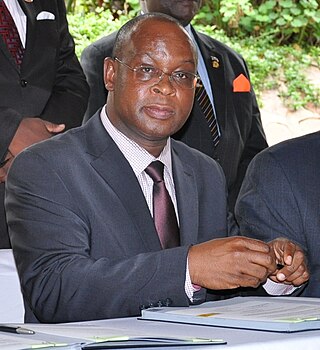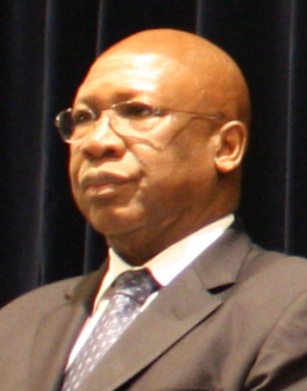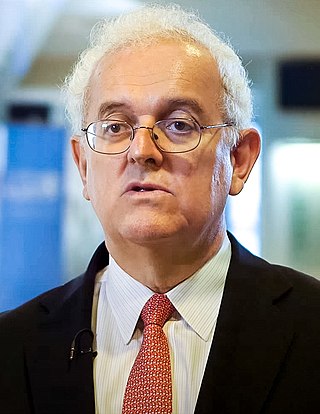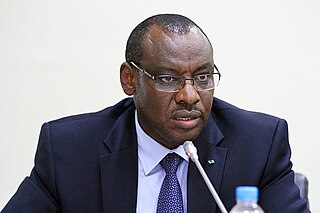Related Research Articles

The United Nations Economic and Social Council (ECOSOC) is one of the six principal organs of the United Nations, responsible for coordinating the economic and social fields of the organization, specifically in regards to the fifteen specialized agencies, the eight functional commissions, and the five regional commissions under its jurisdiction.

The United Nations Conference on Trade and Development (UNCTAD) is an intergovernmental organization within the United Nations Secretariat that promotes the interests of developing countries in world trade. It was established in 1964 by the United Nations General Assembly (UNGA) and reports to that body and the United Nations Economic and Social Council (ECOSOC). UNCTAD is composed of 195 member states and works with nongovernmental organizations worldwide; its permanent secretariat is in Geneva, Switzerland.

The New Partnership for Africa's Development (NEPAD) is an economic development program of the African Union (AU). NEPAD was adopted by the AU at the 37th session of the Assembly of Heads of State and Government in July 2001 in Lusaka, Zambia. NEPAD aims to provide an overarching vision and policy framework for accelerating economic co-operation and integration among African countries.

The United Nations Economic Commission for Africa was established in 1958 by the United Nations Economic and Social Council to encourage economic cooperation among its member states following a recommendation of the United Nations General Assembly. It is one of five regional commissions.

In the United Nations, the Millennium Development Goals (MDGs) were eight international development goals for the year 2015 created following the Millennium Summit, following the adoption of the United Nations Millennium Declaration. These were based on the OECD DAC International Development Goals agreed by Development Ministers in the "Shaping the 21st Century Strategy". The Sustainable Development Goals (SDGs) succeeded the MDGs in 2016.

The United Nations Institute for Training and Research (UNITAR) is a dedicated training arm of the United Nations system. UNITAR provides training and capacity development activities to assist mainly developing countries with special attention to Least Developed Countries (LDCs), Small Island Developing States (SIDS) and other groups and communities who are most vulnerable, including those in conflict situations.

Maxwell Mkwezalamba is a Malawian politician and economist. He is currently First Alternate Executive Director for Africa Group 1 Constituency, comprising 23 African countries, at the International Monetary Fund in Washington, DC, USA. Before this appointment, he briefly served as Minister of Finance for Malawi under former President Dr. Joyce Banda, before Cabinet was dissolved prior to the May 20, 2014 Tripartite Elections. Between May 2004 and April 2013, he served as Commissioner for Economic Affairs for the African Union in Addis Ababa, Ethiopia. When President Peter Mutharika ascended to power in June 2014, the Finance portfolio was given to Goodall Gondwe.

The African Peer Review Mechanism (APRM) is a mutually agreed instrument voluntarily acceded to by the member states of the African Union (AU) as a self-monitoring mechanism. It was founded in 2003.

Mahmoud Mohieldin, is an economist with more than 30 years of experience in international finance and development. He is the UN Climate Change High-Level Champion for Egypt. He is an Executive Director at the International Monetary Fund. He has been the United Nations Special Envoy on Financing the 2030 Sustainable Development Agenda since February 2020. He was the Minister of Investment of Egypt from 2004-2010, and most recently, served as the World Bank Group Senior Vice President for the 2030 Development Agenda, United Nations Relations and Partnerships. His roles at the World Bank also included Managing Director, responsible for Human Development, Sustainable Development, Poverty Reduction and Economic Management, Finance and Private Sector Development, and the World Bank Institute; World Bank President's Special Envoy on the Millennium Development Goals (MDGs), the Post-2015 Development Agenda, and Financing for Development; and Corporate Secretary and Executive Secretary to the Development Committee of the World Bank Group's Board of Governors. Dr Mohieldin also served on several Boards of Directors in the Central Bank of Egypt and the corporate sector. He was a member of the Commission on Growth and Development and was selected for the Young Global Leader of the World Economic Forum in 2005. His professional experience extends into the academic arena as a Professor of Economics and Finance at the Faculty of Economics and Political Science, Cairo University and as a Visiting Professor at several renowned Universities in Egypt, Korea, the UAE, the UK and the USA. He is a member of the International Advisory Board of Durham University Business School. He also holds leading positions in national, regional and international research centres and associations. He has authored numerous publications and articles in leading journals in the fields of economics, finance and development.

The Great Green Wall or Great Green Wall of the Sahara and the Sahel is a project adopted by the African Union in 2007, initially conceived as a way to combat desertification in the Sahel region and hold back expansion of the Sahara desert, by planting a wall of trees stretching across the entire Sahel from Djibouti, Djibouti to Dakar, Senegal. The original dimensions of the "wall" were to be 15 km wide and 7,775 km long, but the program expanded to encompass nations in both northern and western Africa. The concept evolved into promoting water harvesting techniques, greenery protection and improving indigenous land use techniques, aimed at creating a mosaic of green and productive landscapes across North Africa. Later it adopted the view that desert boundaries change based on rainfall variations.
Mario Joaquim Azevedo is a Mozambican novelist, historian, professor, and epidemiologist.
The United Nations Sustainable Development Group (UNSDG), previously the United Nations Development Group (UNDG), is a consortium of 36 United Nations funds, programmes, specialized agencies, departments and offices that play a role in development. It was created by the Secretary-General of the United Nations in order to improve the effectiveness of United Nations development activities at the country level.
Kingsley Y. Amoako is a Ghanaian international civil servant with a five-decade career in African development. He is a thought leader on policies and initiatives of governance and growth on the continent, and he has worked alongside development specialists to address African and global development issues.

Abdoulie Janneh is a Gambian diplomat and economist. He served as executive secretary of the UN Economic Commission for Africa from 2005 to 2012. Since leaving the UN, he has worked as executive director of the Mo Ibrahim Foundation. In 2018, he was appointed as chairperson of commissioners of the Gambian Truth, Reconciliation and Reparations Commission (TRRC).

José Antonio Ocampo Gaviria is a Colombian writer, economist and academic who was the professor of professional practice in international and public affairs and director of the Economic and Political Development Concentration at the School of International and Public Affairs at Columbia University from July 2007 to August 2022. Prior to his appointment, Ocampo served in a number of positions in the United Nations and the Government of Colombia, most notably in the United Nations as Under-Secretary-General for Economic and Social Affairs and Executive Secretary for the Economic Commission for Latin America and the Caribbean, and in Colombia as Minister of Finance and Public Credit and Minister of Agriculture and Rural Development.

Amina Jane Mohammed is a British Nigerian diplomat and politician who is serving as the fifth Deputy Secretary-General of the United Nations. Previously, she was Nigerian Minister of Environment from 2015 to 2016 and was a player in the Post-2015 Development Agenda process. She is also Chair of United Nations Sustainable Development Group.

Claver Gatete is a Rwandan politician and diplomat who has been serving as the Executive Secretary of United Nations Economic Commission for Africa since 2023.

Vera Songwe is an economist and banking executive from Cameroon who worked for the World Bank from 1998-2015, and in 2015-2017 served as Western and Central Africa's regional director for the International Finance Corporation. She was the first woman to head the U.N.'s Economic Commission for Africa (ECA) at the level of Under Secretary-General. Songwe currently serves as a non-resident Senior Fellow at the Brookings Institution's Africa Growth Initiative.
Muhammad Sani Abdullahi popularly known as Dattijo is a Deputy Governor of Economic Policy at the Central Bank of Nigeria. President Bola Ahmed Tinubu appointed Muhammad as Deputy Governor on 15 September 2023, and his appointment was confirmed by the Nigerian Senate on 23 September, 2023. Dattijo served as a policy adviser at the Executive Office of United Nations Secretary General Ban Ki Moon in New York. Dattijo formed the core team that developed the Sustainable Development Goals (SDGs). Dattijo resigned from this appointment to serve the Nigerian government as the Commissioner for Budget and Planning in Kaduna State. He published a book titled "Disruption Rethinking Governance to work for the Poor." On 2 July 2023.
Obadiah Mailafia born on was a Nigerian development economist and the 2019 Nigeria Presidential election Candidate of African Democratic Congress (ADC). He was a former official of the African Development Bank Group and one-time Deputy Governor of the Central Bank of Nigeria (CBN). He was also the Chief of Staff of the African, Caribbean and Pacific Group of States (ACP), the 79-nation multilateral development institution based in Brussels, Belgium.
References
- ↑ Nnadozie, Emmanuel, ed. (2003-02-01). African Economic Development (1 ed.). Amsterdam: Academic Press. ISBN 9780125199926.
- ↑ Profiles of Speakers.
- ↑ "Executive Secretary | African Capacity Building Foundation". www.acbf-pact.org. Archived from the original on 2014-10-03.
- ↑ "Interview with ECA's Trade, Finance and Economic Development Division Director, Emmanuel Nnadozie". African Development Bank. Retrieved 2017-10-20.
- ↑ "United Nations Economic Commission for Africa". www.uneca.org. Retrieved 2017-10-20.
- ↑ "Africa Progress Panel" (PDF).
- 1 2 "Archived copy" (PDF). Archived from the original (PDF) on 2011-07-20. Retrieved 2010-09-27.
{{cite web}}: CS1 maint: archived copy as title (link) - ↑ Azevedo, Mario J. (1998). Roots of Violence: A History of War in Chad. Routledge. pp. xiii. ISBN 90-5699-582-0.